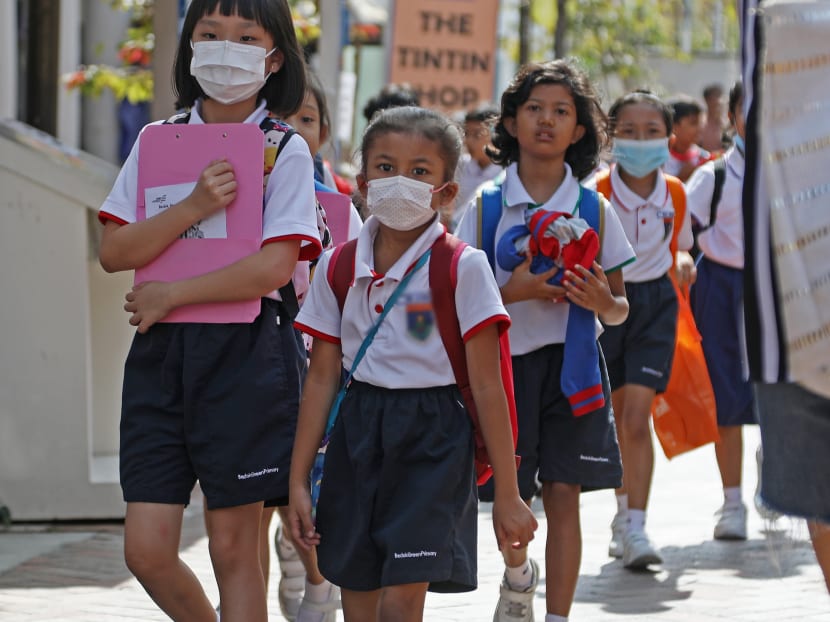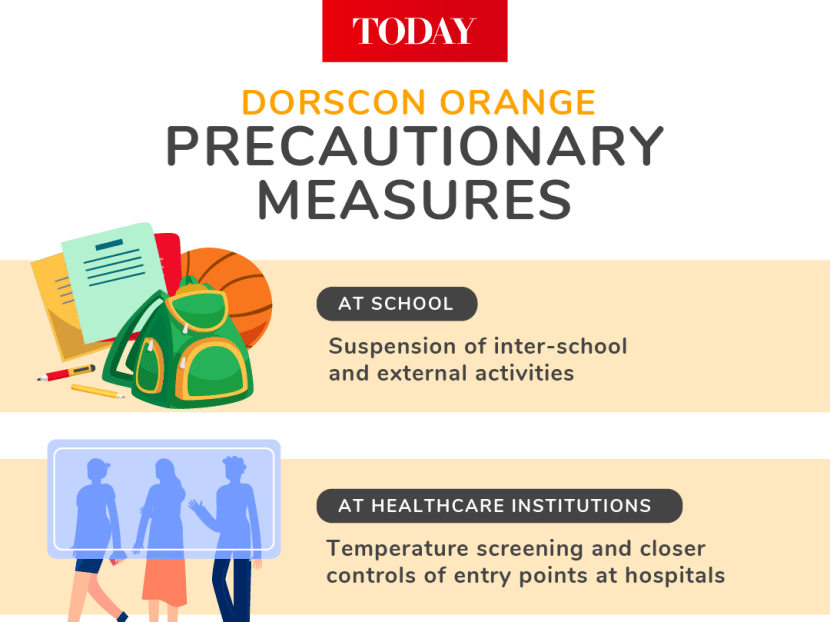Dorscon Orange: What it means for schools, workplaces and healthcare institutions
SINGAPORE — The raising of the Disease Outbreak Response System Condition (Dorscon) alert level to Orange will affect schools, workplaces and healthcare institutions.

All inter-school activities will be suspended with immediate effect and workplaces are advised to step up their business continuity plans which includes telecommuting or team segregation.
SINGAPORE — The raising of the Disease Outbreak Response System Condition (Dorscon) alert level to Orange will affect schools, workplaces and healthcare institutions.
Dorscon is a colour-coded framework that shows the current disease situation.
On Friday (Feb 7), the Ministry of Health (MOH) raised the risk alert level from Yellow to Orange because there were a few coronavirus cases in Singapore without any links to previous cases or with travel histories to China.
HOW IT WILL AFFECT SCHOOLS
For schools, this will mean a suspension of inter-school and external activities with immediate effect.
This includes national school games, learning journeys and camps. The suspension will last until the end of the March school holidays.
Ms Liew Wei Li, the director of schools at the Ministry of Education, said that this suspension will be reviewed at the end of the March school holidays.
She explained that the aim of the measures is to reduce intermingling and students’ exposure to crowds.
MOH said that schools will continue to implement enhanced measures that were announced earlier which include classroom-based assemblies, staggered recess times and co-curricular activities in smaller groups.
At primary schools, for example, teachers are accompanying pupils to sinks before recess and snack times to ensure they wash their hands.
Students have also been encouraged to clean their eating surfaces after meals, Ms Liew said.
At preschools, with the change in alert level, they will limit the number of visitors to their premises.
AT HEALTHCARE INSTITUTIONS
The raised risk assessment level will mean the implementation of temperature screening and closer controls of entry points at hospitals.
Hospitals will also introduce measures to care for patients with pneumonia separately from other patients in order to reduce the risk of infection.
MOH will work with healthcare institutions to enhance infection control, while eldercare services will limit the number of visitors to their premises.
EFFECT ON WORKPLACES
At workplaces, MOH advised all employers to get their employees to take their temperature twice a day.
Employers should also be on the lookout for employees with respiratory symptoms such as coughs and runny noses, and those with a fever or who feel unwell should leave the office immediately and see a doctor.
MOH advised all workplaces to step up their business continuity plans which could include allowing employees to work from home or to separate teams.
MORE PRECAUTIONS FOR LARGE-SCALE EVENTS
The Government is advising event organisers to cancel or defer non-essential large scale events.
For those proceeding with these events, MOH said that the necessary precautions should be taken.
Besides temperature screenings and travel declarations, measures include maintaining a registration list of participants if practical, ensuring that all event venues are ventilated and are adequately equipped with facilities for hand-washing.
MINIMISE HANDSHAKES, TURN UNWELL CUSTOMERS AWAY
MOH cautioned that the measures taken at a national level will be effective in containing the spread only if individuals played their part.
It advised individuals not to shake hands during this period but “adopt alternative greetings”.
Workers who come across customers who are unwell should advise such customers to leave and see a doctor, it added.
Even with community transmissions, it said, the most effective method to prevent transmission is through good personal hygiene of regular hand-washing with soap and water, and the use of hand sanitiser when soap and water are unavailable.
Also, those who are unwell should stay at home and wear a mask if they head out to see a doctor.










